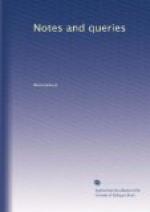“But thou, proud Chame, which thus
hast wrought me spite,
Some greater river drown thy hatefull
name;
Let never myrtle on thy banks delight;
But willows pale, the leads of spite and
blame,
Crown thy ungratefull shores with scorn
and shame: {150}
Let dirt and mud thy lazie
waters seize,
Thy weeds still grow, thy
waters still decrease;
Nor let thy wretched love to Gripus ever
cease.”
P. 13. ed. 1633.
See also the “Masque,” in Beaumont and
Fletcher’s Maid’s Tragedy, Act
I. vol. i. p. 17. edit. 1750.
On l. 936. (G.):—
“And here and there were pleasant
arbors pight,
And shadie seats and sundry flowring
banks.”
Spenser’s F. Queen, vol. ii. p. 146. ed. 1596.
On l. 958. (G.):—
“How now! back friends! shepherd, go off a little.”
As You Like It, iii. 2.
On l. 989. (D.) See Bethsabe’s address to Zephyr in tire opening of Peele’s David and Bethsabe:—
“And on thy wings bring delicate perfumes.”
On l. 995. (D.):—
“Her gown should be goodliness
Well ribbon’d with renown,
Purfil’d with pleasure in
ilk place
Furr’d with fine fashioun.”
Robert Henryson’s Garment of Good Ladies. See Ellis’ Spec. of Early Eng. Poets, i. 362.
J.F.M.
* * * * *
FOLK LORE.
High Spirits considered a Sign of impending Calamity or Death (Vol. ii., p. 84.).—
“Westmoreland. Health to my lord, and gentile cousin, Mowbray.
Mowbray. You wish me health
in very happy season;
For I am, on the sudden, something ill.
Archbishop of York. Against
ill chances, men are ever merry;
But heaviness foreruns the good event.
West. Therefore be merry,
cos; since sudden sorrow
Serves to say thus,—Some good
thing comes to-morrow.
Arch. Believe me, I am passing light in spirit.
Mow. So much the worse, if your own rule be true.”
Second Part of King Henry IV., Act iv. Sc. 2.
In the last act of Romeo and Juliet, Sc. 1, Romeo comes on, saying,—
“If I may trust the flattering eye
of sleep,
My dreams presage some joyful news at
hand:
My bosom’s lord sits lightly on
his throne;
And, all this day, an unacustom’d
spirit
Lifts me above the ground with cheerful
thoughts.”
Immediately a messenger comes in to announce Juliet’s death.
In Act iii. Sc. 2., of King Richard III., Hastings is represented as rising in the morning in unusually high spirits. This idea runs through the whole scene, which is too long for extraction. Before dinner-time he is beheaded.
X.Z.
Norfolk Popular Rhymes.—On looking over an old newspaper, I stumbled on the following rhymes, which are there stated to be prevalent in the district in which these parishes are situated, viz. between Norwich and Yarmouth:—




